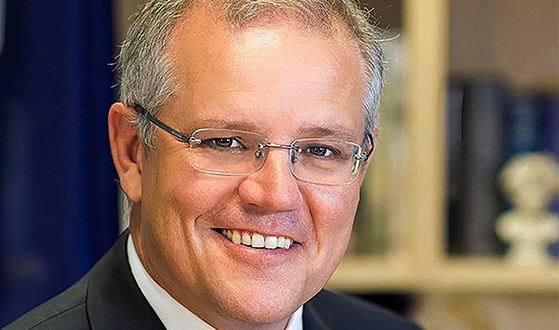Scott Morrison - A cleaner environment for all Australians
- Written by Scott Morrison

A re-elected Morrison Government will invest $203 million to increase recycling and reduce waste, protect Australia’s unique threatened species and restore our waterways and coasts.
Prime Minister Scott Morrison said he wanted to ensure Australia’s environment was protected for future generations.
“We have the best beaches, parks and rivers in the world and these measures support practical and meaningful activities that protect our environment and gets results,” Mr Morrison said.
“We will increase Australia’s recycling rates, tackle plastic waste and litter, accelerate work on new recycling schemes and continue action to halve food waste by 2030.”
This new national waste and recycling initiative includes:
- $100 million Australian Recycling Investment Fund through the Clean Energy Finance Corporation to support manufacturing of lower emissions and energy-efficient recycled content products, such as recycled content plastics and paper/pulp.
- $20 million for a new Product Stewardship Investment Fund to accelerate work on new industry-led recycling schemes, including for batteries, electrical and electronic products, photovoltaic systems and plastic oil containers.
- $20 million to find new and innovative solutions to plastic recycling and waste through the Cooperative Research Centres Projects grants program.
- $16 million to support the Pacific Ocean Litter Project, working with our Pacific neighbours to reduce plastics and other waste in our oceans.
- Up to $5.8 million for a range of initiatives through the Environment Restoration Fund to support the great work of Clean Up Australia, Keep Australia Beautiful, the Australian Council of Recycling, Planet Ark, the Australian Packaging Covenant Organisation and OzHarvest.
- Up to $5 million through the Environment Restoration Fund for Conservation Volunteers Australia to coordinate community campaigns to clean up plastic waste in our beaches and rivers.
- Continuing to work with state, territory and local governments on opportunities to get more recycled content into road construction, building on the funding provided to the Australian Road Research Board in the 2019-Budget.
Treasurer Josh Frydenberg said the projects announced today directly improve the quality of the environment for the benefit of all Australians.
“At the same time as meeting our emissions targets without harming the economy, we are reducing physical waste, cleaning up our environment and ensuring it is protected for generations to come.”
“Notably, our urban waterways and coastal areas will receive funding of over $15 million through the Environment Restoration Fund. This will go towards cleaning up important systems, including up to $2 million to clean up Melbourne’s iconic Yarra River and improve the environmental health of both the Yarra and Port Phillip Bay.”
Other waterways supported will include River Torrens, Swan-Canning River, Brisbane River and the Hawkesbury and Nepean Rivers.
A re-elected Morrison Government will also invest $10 million through the Environment Restoration Fund in an important program to establish feral predator-free ‘safe havens’ for Australia’s threatened native species.
The safe havens will secure the future of many of our threatened mammals and birds, including species such as the Eastern Quoll, Mountain Pygmy Possum, the Long-nosed Potoroo and Black-footed rock-wallaby.
Environment Minister Melissa Price said achieving tangible improvements for the environment through practical initiatives has been a priority.
“These projects will play a significant role in protecting our natural assets.”
“From reducing the amount of plastic that occupies our coastal waters; improving the quality of local waterways; to ensuring the protection of some of our most iconic and vulnerable species; today’s announcement targets all of these challenges.”
$6 million will also be provided to protect the koalas of South-East Queensland and Northern NSW, with funding for hospital and research facilities at Australia Zoo, the Currumbin Wildlife Sanctuary and the Queensland RSPCA, as well as protection and restoration of important habitat across the region.
A further $6 million will be invested to protect other threatened species including WA’s Black Cockatoos, Bruny Island’s Eastern Quolls and Kangaroo Island’s endangered Dunnart.
The Morrison Government is only able to make these investments because of a strong economy.
Our cleaner environment plan is backed by a strong record of delivery, including:
- Meeting our international climate targets with a $3.5 billion Climate Solutions Plan
- Delivery of the Reef 2050 Plan and a record $1.2 billion investment in the Great Barrier Reef, including our Great Barrier Reef Partnership Program
- $1 billion for the second phase of the National Landcare Program
- $425 million already invested in the protection of threatened species and appointment of the country’s first Threatened Species Commissioner
- Up to $216 million to improve facilities in Kakadu National Park
- $100 million Environment Restoration Fund
- Over $22 million to support local environment projects through the Communities Environment Program
- Establishment of the world’s second largest network of marine parks
- $21.4 million for infrastructure upgrades at important defence heritage sites around Sydney Harbour
- Record $2.8 billion investment in Antarctic science, infrastructure and operations





